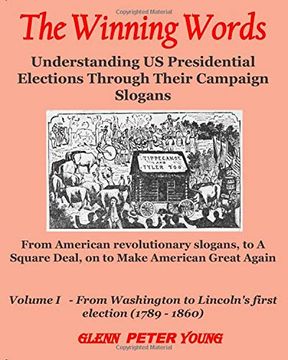The Winning Words - vol i: Understanding U. S. Presidential Elections Through Their Campaign Slogans - From American Revolutionary Slogans to a Square Deal to Make America Great Again
Synopsis "The Winning Words - vol i: Understanding U. S. Presidential Elections Through Their Campaign Slogans - From American Revolutionary Slogans to a Square Deal to Make America Great Again"
This work is a review of some of the most famous, and some not so famous; successful, and not so successful; official and unofficial campaign slogans used in nearly two hundred and fifty years of our presidential elections. Also included in this review are some campaign songs, political cartoons and other relevant electioneering tools that are part of this story. However, the main focus of this work is on the slogans of the winning and losing major party candidates. In addition, some of the key slogans of impacting third-party candidates will also be examined, as well as the social forces behind these alternative candidates and their slogans.The goal of this effort is not just to give a minor civics lesson on the history of American elections. The more complete goal is to see if, through the examination of the slogans, we can figure out “the mood,” “the needs,” and perhaps even the “psychological state” of American voters at the time each slogan was being used; or what was the idea or purpose behind the “repetitive expression.” In addition, and perhaps most importantly, the overt, and covert messages conveyed by these slogans to given populations of voters. The main reason for this evaluation is to attempt to find – even with the massive changes in culture that occurred over our nation’s history - a commonality to the winning slogans (and a common deficit of the losing one’s). Based on the evaluation presented in this book, what can be seen is that, despite the incredible economic and social upheavals created with technological and demographic changes over the course of our history: there seems to be truly a commonality in these political messages. The slogans (along with the songs, papers, and other campaign devices) were always aimed at the “needs,” or at least “interests,” or projected or proposed interests of what appeared to be the majority voting bloc of the time. Throughout most of American history that majority block was mainly poor white men; at first men who were primarily farmers, then later factory workers and farmers, and today they fit into a wide range of the modern economy. After 1920, the block came to include poor white females; who were also farmers and factory workers, or women married to farmers and factory workers. Today, they are have also spread out into the modern economy, but have also developed their own almost exclusive subset of voters - single parents. Most of the campaign slogans used were directly aimed at this block of people. Sometimes the slogans were banal, sometimes directly or covertly racist; sometimes promoting the "man" and sometimes a grand idea; but mostly they were slogans promising a better life to the poor white male of the time. At the same time the slogans often hid the patrons of the political parties (the rich) or mildly attacked the rich; to gain appeal from the poor white voters. This work is presented in three volumes 1) Washington to through the first Lincoln; the second Lincoln to the first FDR; and the second FDR to the Clinton Trump campaign of 2016. As noted it turns out there is a pattern and similarity in the campaign slogans of our history, and of today.

